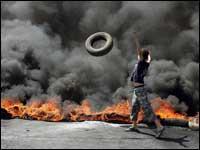Transcript
BROOKE GLADSTONE:
From WNYC in New York, this is NPR’s On the Media. I’m Brooke Gladstone.
BOB GARFIELD:
And I’m Bob Garfield. Last weekend in Tripoli, a raid on the hideout of suspected bank robbers turned into a week-long battle between Islamist militants and the Lebanese Army.
It occurred mostly on the outskirts of the Palestinian refugee camp where the militants are based, and the army is not permitted to enter. Dozens of combatants and civilians have been killed. The militant group is called Fatah al- Islam, founded last year as an offshoot of a Syrian-backed Palestinian faction.
BROOKE GLADSTONE:
That much we know, but as is so often the case in the Land of Cedars, the rest of the who, what and why of this story is murky.
The Lebanese government says that Syria is behind the militants and that Damascus timed the assault to coincide with the Security Council’s deliberations on a tribunal for the assassins of former Lebanese Prime Minister Rafik Hariri, but Fatah al-Islam denies any connection to Syria.
We called Habib Battah, managing editor of The Journal of Middle East Broadcasters in Beirut, to find out how the story is being told on Lebanese TV. Habib, welcome to On the Media.
HABIB BATTAH:
Thanks very much.
BROOKE GLADSTONE:
So the Lebanese government has been insisting all along that Fatah al-Islam is backed by Syria. Is this account being picked up by the TV stations you’ve been watching?
HABIB BATTAH:
It depends on which channel you’re watching, because Lebanese TV is dominated by political parties. Now, the Syrian connection is very controversial here. Some channels will just go ahead and play that, which plays into the pro-American government of Lebanon.
On the channels that are supportive of Hezbollah and other Lebanese opposition channels, you won’t see that claim played up so much, though, you know, you really have to watch all the Lebanese channels to get all the points of view, which is different in America, for example, where, you know, the local evening news on Channels 1, 2, 3, 4, 5 or whatever, pretty much have the same stories with different camera angles and, you know, a different kicker.
BROOKE GLADSTONE:
Three months ago The New Yorker magazine ran a piece by investigative journalist Seymour Hersh that included an alternative version of events. He said that Fatah al-Islam was among several Sunni militant groups being covertly backed by the American, Lebanese and Saudi governments, in an attempt to counter the growing influence of Hezbollah, which is obviously a Shiite militia.
Very little, if any, of the reporting here in the States has picked up that storyline. What about where you are?
HABIB BATTAH:
That has been picked up. Al-Minar very much likes to play analysts who quote Seymour Hersh. Hezbollah backs the channel. The pro-government channels obviously won’t tell that story.
BROOKE GLADSTONE:
A lot of the reporting here has also focused on the connection, or at least the sympathies, between Fatah al-Islam and al-Qaeda. Is that being dwelled on over there, or do you think this is just an American storyline?
HABIB BATTAH:
No, no, that’s definitely [LAUGHS] a convenient storyline for the Bush administration, and the looming confrontation, it seems, with Syria.
But, you know, at this point it’s very difficult to say where these groups really come from. The only evidence so far that’s been presented – it’s been circumstantial evidence – is that they are Syrian-backed and that Damascus stands to gain the most from stopping the international tribunal.
Then again, other channels are very critical of the Lebanese government. They say the Lebanese government is at fault here, because they haven’t taken action to disarm these camps.
One of the main questions that’s not talked about
by the American media here, and the Lebanese media, for a lot of reasons, is why there is this hatred in these camps, and why do these camps exist? Why do we have 350,000 people living in Lebanon in these tight conditions?
You know, everything is broken, everything is polluted, and it’s like growing up in a prison, basically, because you can’t own property outside the camp, you can’t really work outside the camp, so you’re confined to the camp. You know, it’s a really hopeless reality, to be in these camps.
BROOKE GLADSTONE:
But these are long-standing conditions, Habib, and what we have here is a breaking story about a new group that seemed to come from elsewhere and just planted themselves near the camps, because this was a lawless area where the Lebanese militia wasn’t likely to be able to get at them.
HABIB BATTAH:
That’s definitely true, but I do believe that the reason that these lawless areas exist – these pockets of lawlessness – is really part of a bigger question as to, you know, what is the big event, half a century ago, that created these camps, not just in Lebanon, but across the Middle East?
BROOKE GLADSTONE:
You’re talking about the creation of Israel.
HABIB BATTAH:
Well, I’m talking about the refugee crisis that followed the creation of Israel, where, you know, some 700,000 Palestinians were made homeless. They were never made citizens of Lebanon because that has inflamed tensions in the country to the point where we had a civil war over it, and the Lebanese Army, after a civil war, decided that raiding these camps would be detrimental to the future of the country.
So the camps, you know, they’re really a beehive of anger and hostility, and they really need to be addressed in the media, I think, in a more thorough context, because even if this group is wiped out, there will be other groups, if the situation and the conditions persist in these camps.
BROOKE GLADSTONE:
Habib, thank you very much.
HABIB BATTAH:
No problem. Thank you.
BROOKE GLADSTONE:
Habib Battah is managing editor of The Journal of Middle East Broadcasters. He spoke to us from Beirut.

